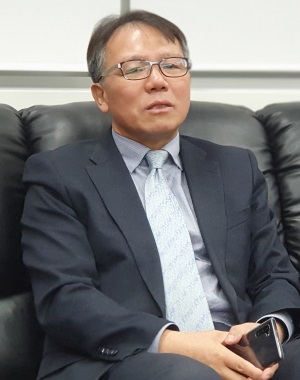The Ministry of Food and Drug Safety will push for utilizing artificial intelligence and big data, establishing an official channel to better communicate with the industry, and strengthening international cooperation and trade, in 2020.
For advancing the pharmaceutical and biotech industry, the ministry said it would seek to cooperate with regulators in other countries to help Korean companies enter the global market.

Kim Young-ok, director-general of the ministry’s Pharmaceutical Safety Bureau, shared his evaluations on the ministry’s programs last year and plans for this year at a meeting with reporters on Tuesday.
The pharmaceutical industry had many ups and downs last year, but the government yielded some fruitful results in providing more treatment opportunities for patients with rare and intractable diseases and the underprivileged, Kim said.
He explained that the ministry started to provide clinical trial information through an integrated drug information website to help patients with rare and intractable diseases and the marginalized get information about the latest treatments.
Managing clinical trials is a double-edged sword because the government has to control the safety of drugs but accelerate the entry of new drugs at the same time, Kim noted.
“With this in mind, we built a five-year plan last year. This will be the first year to help companies and patients get to benefit from the newly established information site,” he said.
This year, the food and drug ministry will use AI and big data in policies, Kim noted.
“There are abundant data in the pharmaceutical area, and we are searching for ways to use them in our policies,” he said. “The ministry was also looking for ways to encourage the public and businesses to receive or use such data.”
The ministry’s second task for this year was reinforcing internal and external communication.
Kim admitted the ministry’s communication has not been adequate, although it had too many things to manage concerning pharmaceutical products, ranging from review and approval to post-sales management, By making an official channel for communication, the ministry will allow not only outside people but ministry officials to freely speak up and get answers to their questions, he emphasized.
Thirdly, the ministry plans to enhance international cooperation and trade to support Korean companies’ entry into overseas markets, according to Kim.
Korea signed a memorandum of understanding with Switzerland and France and got on the whitelist as entrusted trading partners. Also, the regulator made efforts to persuade the Vietnamese government to maintain the rating of Korean drugmakers in public bidding at Grade 2, he added.
“Through trade and international cooperation, I learned that the largest obstacle for local drugs to reach the global market is the regulatory institution,” Kim said. “What this ministry can do is to reinforce cooperation with regulatory agencies overseas to support Korean companies’ entry.”
The government will also help Korean companies enter the Chinese market, Kim went on to say.
He said China is a vast market, but it has high entry barriers and strict regulations. However, the market has been changing since Beijing became a member of the International Council for Harmonization of Technical Requirements for Pharmaceuticals for Human Use (ICH) in 2017, he noted.
As China was striving to deregulate according to the international standards, Korean companies should consider entering the Chinese market, Kim said. “For this, the ministry will build cooperative relations with China,” he added.
The Middle East is another market that Korean drug companies could tap, as many European drugmakers have already secured, Kim said.
“There is a demand for Korean medicine in the Middle East. Plus, we could export our pharmaceutical products there, too,” Kim said. “As the pharmaceutical and biotech industry cannot grow by focusing only on the domestic market, they should turn their eyes toward the world.”

